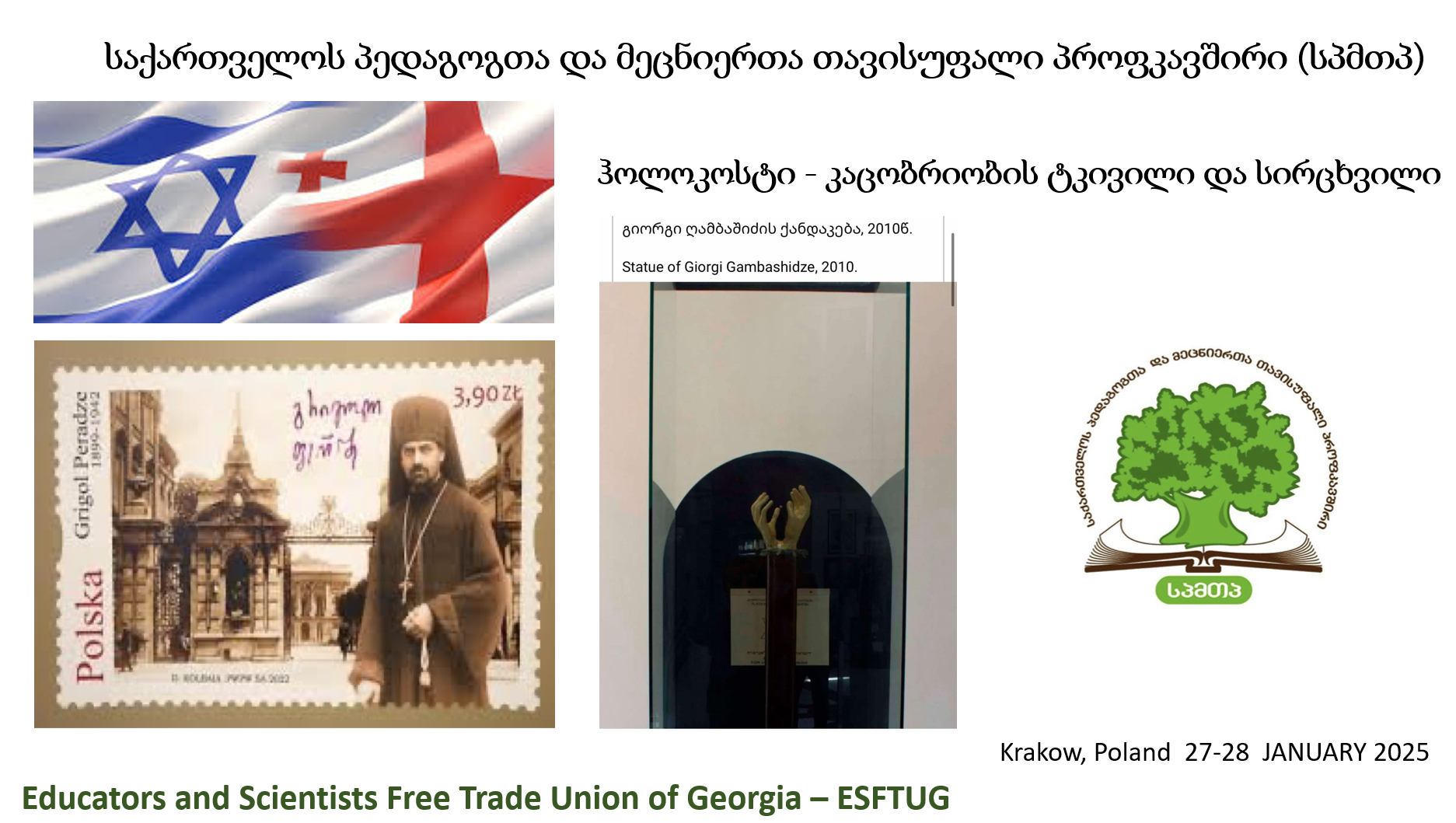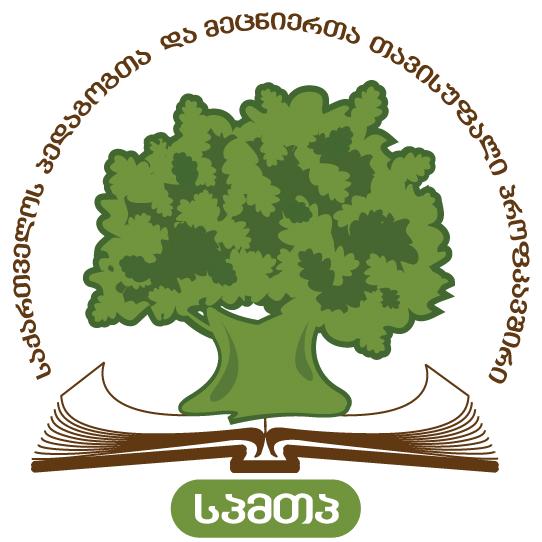80th ANNIVERSARY OF THE LIBERATION OF GERMAN NAZI CONCENTRATION AND EXTERMINATION CAMP AUSCHWITZ
An international conference was held in Krakow, Poland, to commemorate the 80th anniversary of the Holocaust, attended by representatives of education unions from the United States and 20 European countries. The organizers of the conference were the world teachers' organization - Education International (EI), the Ebert Foundation in Poland, and the education unions of Poland (ZNP), Germany (GEW), and Israel (ITU).
The conference emphasized the crucial role of teachers and education unions in shaping the future in a polarized world, stressing the need for greater attention to history education in schools. "Memory is passed on to the third generation and then disappears, so we must preserve history."
The President of the Educators and Scientists Free Trade Union of Georgia (ESFTUG), Maia Kobakhidze, and the Executive Vice President, Mari Alugishvili, participated in the conference.
Maia Kobakhidze, the ESFTUG President spoke about the 26-century coexistence of the Georgian and Jewish people and the historical instances of Georgians risking their lives to save Jews during the Holocaust:
"I represent a country whose history is deeply intertwined with the history of the Jewish people. Jews first arrived in Georgia 26 centuries ago, following the invasions of Israel in the 6th century BC, with another wave arriving in the 1st century AD. The fact that the Georgian Jew Elioz Mtskheteli brought the Holy robe of Jesus to Georgia is a profound example of the close relationship between our two nations. I take great pride in stating that, at no point in history, has there ever been a single instance of raids, violence, or oppression against Jews in Georgia.
In 1913, at the International Jewish Congress in Frankfurt, David Baazov, the rabbi of Georgian Jews declared: “The country from which I come lies in the distant Caucasus. It is called Georgia. This is a country where there has never been a Jewish massacre, have never oppressed our people; we live in harmony, as brothers.'
David Baazov’s speech sharply contrasted with those of other delegates from Europe, who recounted the harsh persecution and oppression of Jews in their respective countries.
The chairman of the Congress, General Lipman, then addressed the delegates with the following words:
'Brothers, before you stand your brother from a faraway country, Georgia. This country may be far from us, but it should be close to the hearts of every Jew. Today, Europe struggles to learn the principles of humanity, while the Georgian nation mastered humanity thousands of years ago.
The Georgian nation can proudly say: "We have had kings, clergy, soldiers, and writers, but the persecution of other nations has never even crossed our minds. The blood of the Jews, spilled across Europe, has never been touched by a Georgian hand."
General Lipman concluded his speech with these words:
"My children, take this as a testament—express your love for the Georgian nation in whatever way you can!"
It is particularly worth highlighting the acts of self-sacrifice by members of the independent Georgian government, who, having been exiled from Georgia in 1921, played a crucial role in saving Jews during the Holocaust.
As you know, Soviet Russia fully occupied Georgia in 1921. The independent Georgian government went into exile in Europe. A small group of them cooperated with the fascist government—but solely with the aim of liberating Georgia from Soviet rule.
During World War II, millions of Soviet soldiers were taken prisoner. At this time, Georgian emigrants—Mikheil Kedia, Doctors of Sciences Mikheil Akhmeteli, Aleksandre Nikuradze, Ioseb Eligulashvili, and the Governor-General of independent Georgia, Shalva Maghlakelidze—actively worked to secure the release of Georgian prisoners. A particular concern for them was the persecution of Georgian Jews. These emigrants successfully convinced the German government that Georgian Jews were not Jews in the European sense, but Georgians who followed the follows of Moses.
Thanks to their efforts, thousands of Georgian Jews were saved from death. Additionally, Jews from other countries who claimed to be Georgians following the Law of Moses also found protection under this argument.
You will likely agree that such a dangerous and selfless act could only be motivated by a deep spiritual connection between Georgians and Jews.
Let me give you another extraordinary example of humanism and self-sacrifice. Grigol Peradze, a Georgian priest, historian, and Doctor of History, Theology and Philosophy, who was a professor at the University of Warsaw, was imprisoned in Auschwitz. When a young Jewish man—a father of five—was sentenced to death, Grigol Peradze voluntarily took his place and was executed in the gas chamber instead.
The heroic deeds of Grigol Peradze were researched by the Georgian Jew David Buzukashvili, who wrote an article about him titled "I Will Die, but You Will Rejoice!" Grigol Peradze has since been canonized as a saint. Notably, the first to advocate for his sainthood was a Georgian Jew.
I can cite many examples of the long-standing coexistence between the Georgian and Jewish people. However, I do not wish to bore you, nor do I want to create the impression that we are proud of only a few isolated facts. Those who are interested can explore the 26-century history of Georgian-Jewish relations through the wealth of information available online”- sited, Ms Kobakhidze, her presentation at Krakow International Conference.
Naturally, one may ask: "What is the situation today?" "Is there anti-Semitism in Georgia?" The answer is a resounding no! A clear testament to this is the Georgian people’s respectful attitude toward Jewish synagogues, the cemeteries of Georgian Jews who have left the country, and Jewish cultural monuments. Even after the mass return of Jews to their historical homeland, Georgians continue to care for synagogues and cemeteries in formerly Jewish-populated villages.
Synagogues exist in every major city in Georgia. In Tbilisi, the Great Synagogue and the Assumption of the Blessed Virgin Mary (Sioni) Cathedral stand side by side, symbolizing the harmony between our communities. The David Baazov Museum of the History of Georgian Jews and Georgian-Jewish Relations operates in Tbilisi and is recognized internationally. It is included in world history and civic education textbooks and is taught at all levels of general education schools. Jews living in Georgia actively participate in the country’s social and cultural life, further strengthening the bond between our nations.
This is the reality in Georgia!”- concluded her speech Ms Maia Kobakhidze, ESFTUG President.
For 14 years, the education trade unions of Poland, Germany, and Israel have been jointly organizing events and activities dedicated to preserving the difficult history of the Holocaust.
"Let us not forget the past, so as not to repeat its mistakes. Let us improve curricula with our pedagogical skills, educate future generations, teach them critical thinking, and raise awareness," said John McGabhan, President of the European Trade Union Committee for Education (ETUCE).
The speakers shared emotional stories, videos of anti-Semitism and the Holocaust.



